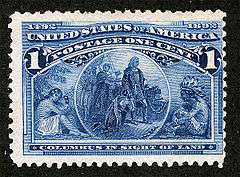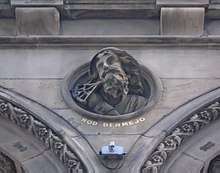Rodrigo de Triana
Rodrigo de Triana (born 1469 in Lepe, Huelva, Spain) was a Spanish sailor, believed to be the first European since Leif Ericson to have seen the Americas. Born as Juan Rodríguez Bermejo, Triana was the son of hidalgo and potter Vicente Bermejo and Sereni Betancour.

On October 12, 1492, while on Christopher Columbus' ship La Pinta, he sighted a land that was called Guanahani by the natives.[1] After spotting the Bahamian island at approximately two o'clock in the morning, he is reported to have shouted "¡Tierra! ¡Tierra!" (Land! Land!). Columbus claims in his journal that he saw "light" at 10 p.m. the previous day, "but it was so indistinct that he did not dare to affirm it was land."[1]
After his return to Spain, Triana sailed to Africa. [2]
NASA's Deep Space Climate Observatory, a satellite originally intended to provide a near-continuous view of the entire Earth, was initially named Triana, after Rodrigo de Triana.

Footnotes
- "Esta tierra vidó primero un marinero que se decía Rodrigo de Triana, puesto que el Almirante a las diez de la noche, estando en el castillo de popa, vidó lumbre aunque fue cosa tan cerrada que no quiso afirmar que fuese tierra." — The Diary of Christopher Columbus
- Helps, Arthur (1856). The Spanish Conquest in America: Vol I. New York: Harper & Brothers. p. 115.